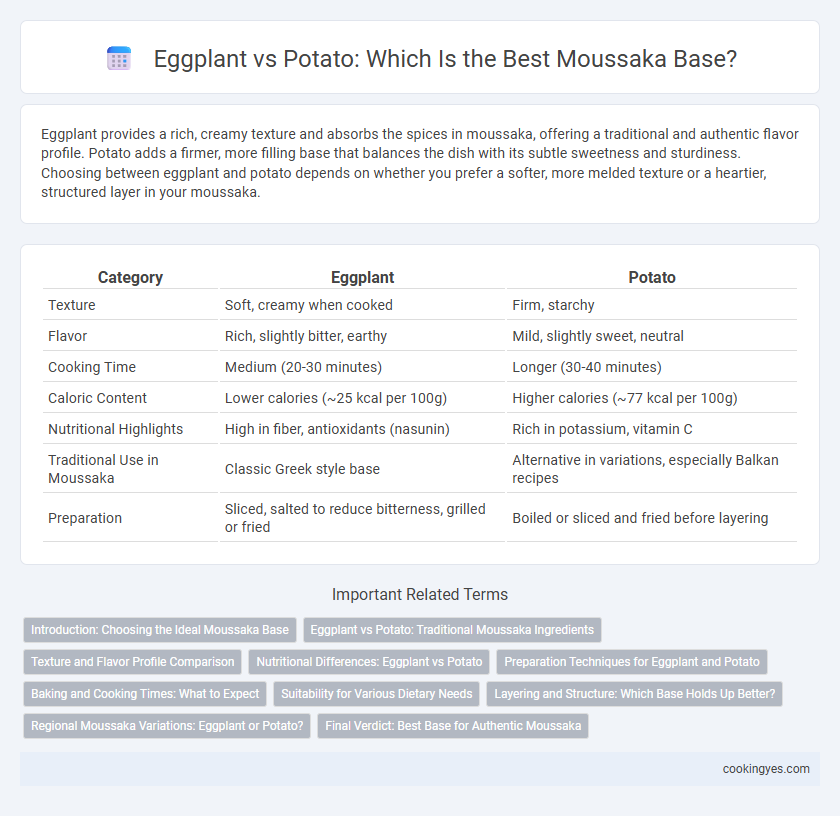Eggplant provides a rich, creamy texture and absorbs the spices in moussaka, offering a traditional and authentic flavor profile. Potato adds a firmer, more filling base that balances the dish with its subtle sweetness and sturdiness. Choosing between eggplant and potato depends on whether you prefer a softer, more melded texture or a heartier, structured layer in your moussaka.
Table of Comparison
| Category | Eggplant | Potato |
|---|---|---|
| Texture | Soft, creamy when cooked | Firm, starchy |
| Flavor | Rich, slightly bitter, earthy | Mild, slightly sweet, neutral |
| Cooking Time | Medium (20-30 minutes) | Longer (30-40 minutes) |
| Caloric Content | Lower calories (~25 kcal per 100g) | Higher calories (~77 kcal per 100g) |
| Nutritional Highlights | High in fiber, antioxidants (nasunin) | Rich in potassium, vitamin C |
| Traditional Use in Moussaka | Classic Greek style base | Alternative in variations, especially Balkan recipes |
| Preparation | Sliced, salted to reduce bitterness, grilled or fried | Boiled or sliced and fried before layering |
Introduction: Choosing the Ideal Moussaka Base
Eggplant offers a traditional, rich flavor and creamy texture that enhances the classic moussaka experience, while potatoes provide a starchier, firmer base that absorbs the savory meat sauce differently. Selecting between eggplant and potatoes influences the dish's overall taste profile and consistency, with eggplant complementing Mediterranean authenticity and potatoes delivering a heartier, more filling option. Understanding these differences helps in crafting a moussaka that aligns with desired taste and texture preferences.
Eggplant vs Potato: Traditional Moussaka Ingredients
Eggplant is the traditional base ingredient in authentic Greek moussaka, prized for its creamy texture and ability to absorb rich meat sauces, creating a well-balanced flavor profile. Potato offers a denser, starchy alternative that adds a firmer bite and subtle sweetness but deviates from classic recipes. The choice between eggplant and potato impacts the dish's authenticity, texture, and overall taste experience, with eggplant remaining the hallmark of traditional moussaka.
Texture and Flavor Profile Comparison
Eggplant offers a creamy, smooth texture that absorbs the rich tomato and meat sauce in moussaka, providing a slightly smoky and earthy flavor ideal for layering. In contrast, potatoes contribute a denser, sturdier bite with a mild sweetness that balances the acidity of the sauce but lacks the depth of eggplant's taste. Choosing eggplant enhances the dish's traditional texture and complex flavor profile, while potatoes create a heartier, more filling base with a subtly different taste experience.
Nutritional Differences: Eggplant vs Potato
Eggplant provides fewer calories and carbohydrates compared to potatoes, making it a lower-calorie option for moussaka base layers. Rich in dietary fiber, antioxidants like nasunin, and essential vitamins such as B1 and B6, eggplant supports heart health and digestion. Potatoes contribute higher levels of potassium and vitamin C but contain more starch, which increases the glycemic index and calorie content of the dish.
Preparation Techniques for Eggplant and Potato
For an authentic moussaka base, eggplants require precise salting and roasting techniques to reduce bitterness and moisture, enhancing their texture and flavor absorption. Potatoes, alternatively, demand thorough parboiling or frying to achieve a firm yet tender consistency that supports the layers without becoming soggy. Mastery of these preparation methods ensures a balanced composition, elevating the traditional Greek casserole's richness and structural integrity.
Baking and Cooking Times: What to Expect
Eggplant and potatoes have distinct baking and cooking times when used as the base for moussaka; eggplant typically requires about 20-25 minutes at 400degF to become tender and slightly caramelized, while potatoes need a longer baking time of 40-50 minutes at 375degF to achieve a soft, cooked-through texture. Eggplant slices absorb less oil and cook faster due to their spongy texture, making them ideal for quicker moussaka preparations, whereas potatoes provide a denser, heartier base but require pre-cooking or parboiling to reduce overall oven time. Understanding these differences helps optimize the layering process, ensuring even cooking and the classic rich consistency essential to traditional moussaka recipes.
Suitability for Various Dietary Needs
Eggplant offers a low-calorie, fiber-rich base ideal for vegetarian and gluten-free moussaka, supporting heart health and weight management. Potatoes provide a higher carbohydrate content, making them suitable for those needing more energy or a gluten-free option with a creamier texture. Both ingredients cater to specific dietary needs, but eggplant is preferred for low-carb and antioxidant benefits, while potatoes suit individuals requiring sustained energy.
Layering and Structure: Which Base Holds Up Better?
Eggplant creates a firmer and more cohesive base for moussaka, maintaining structural integrity through baking due to its dense, meaty texture. Potatoes tend to become softer and can release moisture, potentially leading to a less stable layering and a creamier, less distinct slice. Choosing eggplant enhances the contrast between layers, supporting a well-defined, visually appealing presentation.
Regional Moussaka Variations: Eggplant or Potato?
Regional moussaka variations highlight the choice between eggplant and potato as the base, reflecting local agricultural practices and taste preferences. Greek moussaka traditionally features layered eggplant, emphasizing its creamy texture and rich flavor, while Balkan versions often incorporate sliced potatoes for a heartier, starchy foundation. The choice between eggplant and potato impacts the dish's texture and nutritional profile, with eggplant offering lower calories and antioxidants, and potatoes providing increased fiber and carbohydrates.
Final Verdict: Best Base for Authentic Moussaka
Eggplant stands as the best base for authentic moussaka due to its rich, creamy texture that absorbs the spiced meat sauce and bechamel perfectly, creating the traditional layered flavor profile. Potatoes, while adding a starchy firmness, tend to overshadow the delicate balance of flavors and are considered a variation rather than the authentic foundation. Emphasizing eggplant preserves the classic Mediterranean essence that defines genuine moussaka.
Eggplant vs potato for moussaka base Infographic

 cookingyes.com
cookingyes.com